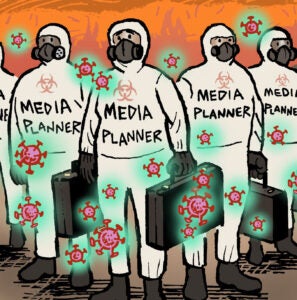Fubo FTW
For the second quarter in a row, things are looking brighter for ol’ Fubo.
Not only has Fubo officially closed a deal to merge with Disney’s Hulu + Live TV Business, but the livestreaming sports platform also ended its third quarter with 1.63 million paid North American subscribers – its highest-ever third-quarter subscriber count, according to yesterday’s investor report.
Once the Fubo and Hulu + Live TV organizations combine, the company will cater to nearly 6 million subscribers, according to what CEO and co-founder David Gandler told investors on Monday’s earnings call.
Fubo’s quarterly revenue for North America declined 2.3% year over year to $386 million, and advertising revenue declined 7% to $25 million, which CFO John Janedis attributed to “the absence of certain ad-insertable content.” (Meaning, in other words, their previous content deals with TelevisaUnivision and WBD.)
But despite those declines, Fubo’s leadership thinks the advertising outlook is pretty good.
Upfront commitments for the 2025-2026 are up 26% compared to last season, with nearly a third of those advertisers being new to Fubo. Revenue from “non-video ad formats,” including pause ads and branded activations, are also up 152% YOY.
Once the merger happens, though, Disney will be taking over Fubo’s advertising sales, which, Gandler said, will likely lead to “pretty strong results relative to where we are today.”
Ken Vue Believe It?
Here’s a fun marketing case study.
Johnson & Johnson is a generations-old name associated with consumer health care. You don’t know Johnson or Johnson, but you know their company.
Except, the brands people do know (Tylenol, Neosporin, Benadryl and Band-Aid, to name a few) were spun out in 2023 as a standalone public company called Kenvue, which nobody recognizes and sounds like enterprise software.
Here’s the twist: Kimberly-Clark has swooped in with a $49 billion acquisition of Kenvue.
It’s a rare opportunity for Kimberly-Clark to upsize to compete with Procter & Gamble, NPR reports.
Kenvue’s price is also way down lately for, shall we say, cosmetic reasons.
Investors are “wary of the deal given the mounting legal risks facing Tylenol,” writes Adam Crisafulli of the equity consultancy Vital Knowledge, as Bloomberg reports.
Ironically, Kenvue was created to separate most of Johnson & Johnson brands from lawsuits related to J&J baby powder. (Talc causes cancer.)
Now Tylenol poses a new liability risk. The painkiller has drawn the ire of President Trump and Health Secretary Robert Kennedy Jr. for allegedly increasing rates of autism in children when taken by pregnant women.
Crisafulli likens it to another “Bayer-Monsanto situation,” referring to Bayer’s disastrous 2018 acquisition that ended up costing Bayer billions in settlements from lawsuits from Roundup, where Monsanto failed to warn of cancer risks or polluted waterways.
That’s 140 years of brand-building.
Early Bird Gets The Gifts
Some say the holiday season begins after Halloween. Others insist it’s Thanksgiving.
But now there’s a third option: It starts as early as September.
Twenty-eight percent of US consumers say they now begin holiday shopping before October, according to a McKinsey survey. And brands are scrambling to keep up.
Holiday campaigns must be up and running by the time consumers begin their gift purchases; otherwise, brands are “behind the eight ball,” Phil Carney, manager of account management at digital marketing platform AdRoll, tells Digiday.
Marketers were apparently prepared, though, with many setting holiday spend as early as August – a full month earlier than usual – according to John Campbell, Disney’s SVP of entertainment and streaming solutions.
Now, advertisers just need to be careful not to spend their entire holiday budget too early – no matter how early consumers plan to shop, the last-minute gift rush is no joke.
But Wait! There’s More!
Analysts from Bank of America confirm that tariffs have raised prices for consumers. [Business Insider]
On a related note, are we in a “K-shaped” economy right now? [Morning Brew]
Google pulls its AI studio model, “Gemma,” after senator Marsha Blackburn accuses it of defaming her. [The Verge]
What AI-generated, hyper-personalized ads actually look like in the wild. [404 Media]
A University of Oxford study finds that conspiracy-laden clickbait does significantly better on social media on a post-by-post basis. [Study Finds]
Thanks to a round of layoffs on Monday, there are now “no more politics staffers” at Teen Vogue. [Lex McMenamin on Bluesky]













